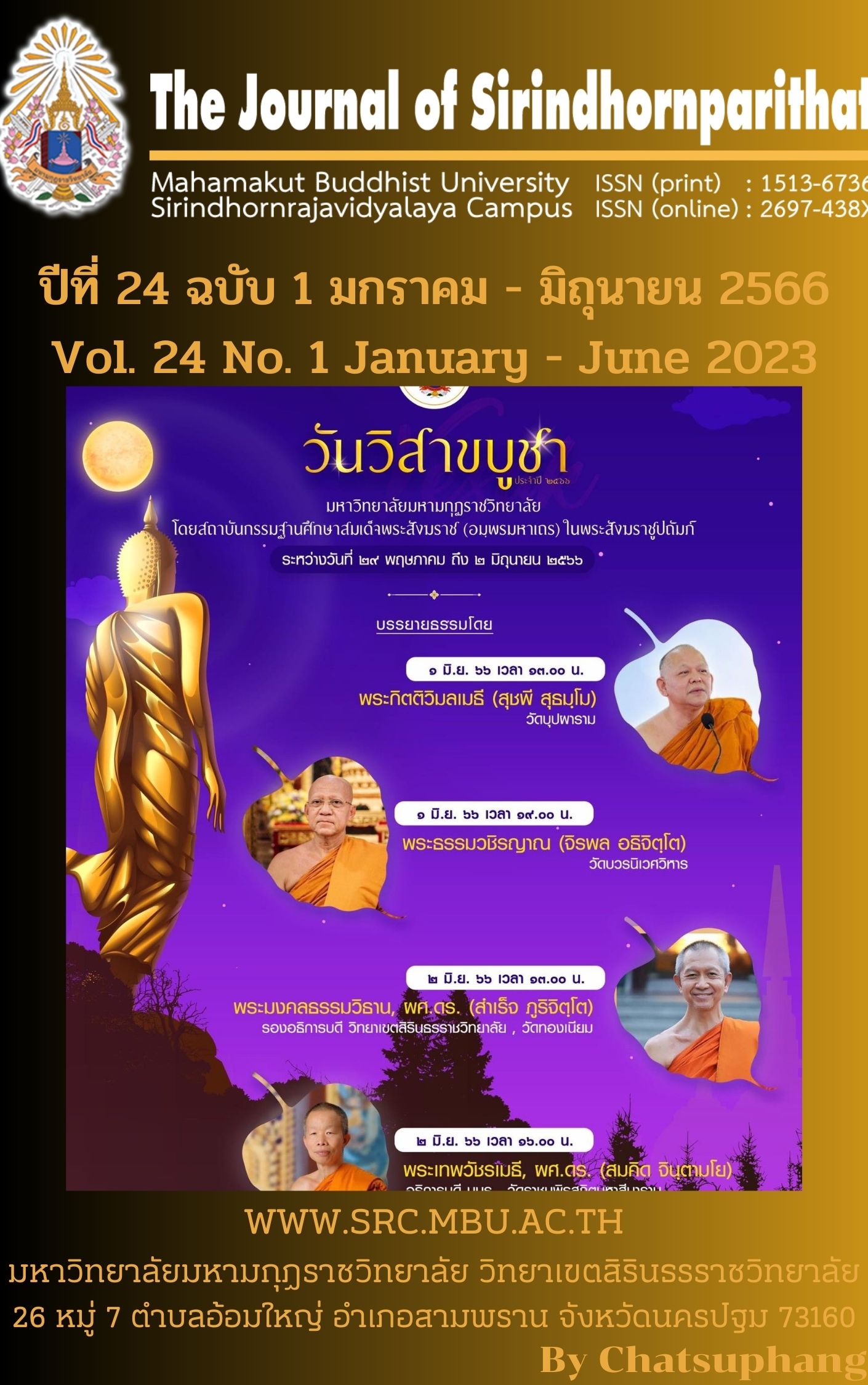Guidelines for The Development of The 4 Brahmavihara Characteristics of The School Administrators Under The Ang Thong Primary Educational Service Area Office
Keywords:
The guidelines of the characteristics development, Brahmavihara 4Abstract
The objectives of this research are: 1) to study the characteristics of school administrators under the Office of Ang Thong Primary Educational Service Area, 2) to study guidelines of the characteristics development of school administrators according to the principles of Brahmavihara, and 3) to propose the guidelines of the characteristics development according to the principles of Brahmavihara of school administrators under the Office of Ang Thong Primary Educational Service Area. The mixed research methodology was used in the study. The quantitative data were collected by questionnaires from 122 samples and analyzed by percentage, frequency, mean and standard deviation. The qualitative data were collected by in-depth interviews and then analyzed by content analysis.
The research results were found that:
The state of characteristics of school administrators under the Office of Ang Thong Primary Educational Service Area was at a high level overall. In descending order, the highest was on human relations, followed by leadership, personality, knowledge, capability, and morality and ethics respectively.
The guidelines of the characteristics development of school administrators according to the principles of Brahmavihara indicated that Metta consists of 9 characteristics, Karuna has 18 characteristics, Mudita has 11characteristics, and Upekkha consists of 12 characteristics.
The guidelines of the characteristics development according to the principles of Brahmavihara of school administrators under the Office of Ang Thong Primary Educational Service Area consist of 6 areas; 1) Development of speaking skill and conversation skill, 2) Development of listening skill, 3) Development of clothing and dressing, 4) Development of emotion, 5) development of world-wide and modern knowledge, and 6) Development of memory.
References
ไชยวัฒน์ กปิลกาญจน์. (2552). กรรมฐานประจำวัน. กรุงเทพมหานคร: โรงพิมพ์ชวนพิมพ์.
ประคอง รัศมีแก้ว. (2551). คุณลักษณะผู้นำของผู้บริหารในสถานศึกษาที่มีคุณภาพ. ดุษฎีนิพนธ์ปรัชญาดุษฎีบัณฑิต. บัณฑิตวิทยาลัย : มหาวิทยาลัยศิลปากร.
เพลินใจ พฤกษชาติรัตน์. (2549).“การพัฒนารูปแบบการพัฒนาภาวะผู้นำของผู้อำนวยการสำนักงานเขตพื้นที่การศึกษา”. ดุษฎีนิพนธ์ครุศาสตรดุษฎีบัณฑิต. บัณฑิตวิทยาลัย: จุฬาลงกรณ์มหาวิทยาลัย.
สุภาวดี วงษ์สกุล. (2555). รูปแบบการพัฒนาผู้นำการเปลี่ยนแปลง ที่มีประสิทธิผลในการบริหารสถานศึกษาขั้นพื้นฐาน. ดุษฎีนิพนธ์ศึกษาศาสตรดุษฎีบัณฑิต สาขาวิชาการบริหารการศึกษา.บัณฑิตวิทยาลัย มหาวิทยาลัยอีสเทิร์นเอเชีย.
หัชพันธ์ เอื้อโชติคุณ. (2557). คุณลักษณะผู้นําที่ไม่ดีที่มีผลในเชิงลบต่อขวัญกําลังใจในการทํางานของผู้ตาม. ดุษฎีนิพนธ์ปรัชญาดุษฎีบัณฑิต สาขาการพัฒนาทรัพยากรมนุษย์และองค์การ (หลักสูตรนานาชาติ). คณะพัฒนาทรัพยากรมนุษย์ สถาบันบัณฑิตพัฒนบริหารศาสตร์.

Downloads
Published
Issue
Section
License
Copyright (c) 2023 Mahamakut Buddhist University

This work is licensed under a Creative Commons Attribution-NonCommercial-NoDerivatives 4.0 International License.
บทความที่ได้รับการตีพิมพ์เป็นลิขสิทธิ์ของ มหาวิทยาลัยมหามกุฏราชวิทยาลัย วิทยาเขตสิรินธรราชวิทยาลัย
ข้อความที่ปรากฏในบทความแต่ละเรื่องในวารสารวิชาการเล่มนี้เป็นความคิดเห็นส่วนตัวของผู้เขียนแต่ละท่านไม่เกี่ยวข้องกับหาวิทยาลัยมหามกุฏราชวิทยาลัย วิทยาเขตสิรินธรราชวิทยาลัย และคณาจารย์ท่านอื่นๆในมหาวิทยาลัยฯ แต่อย่างใด ความรับผิดชอบองค์ประกอบทั้งหมดของบทความแต่ละเรื่องเป็นของผู้เขียนแต่ละท่าน หากมีความผิดพลาดใดๆ ผู้เขียนแต่ละท่านจะรับผิดชอบบทความของตนเองแต่ผู้เดียว



